Search Results
Showing results 1 to 20 of 21
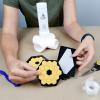
Exploring the Universe: Pack a Space Telescope
Source Institutions
Space telescopes can offer us better, clearer views of the universe (and of our own planet) than Earth-based telescopes can, but getting these large, delicate pieces of equipment into orbit is tricky.
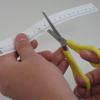
Exploring Size: Tiny Ruler
Source Institutions
In this activity, learners investigate just how small a billionth of a meter is by attempting to cut a paper ruler down to a nanometer-sized sliver.
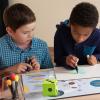
Exploring the Solar System: Mission to Space Board Game
Source Institutions
In this tabletop board game, players will represent a team of scientists and engineers sending a spacecraft on a mission to space.
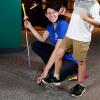
Exploring the Solar System: Stomp Rockets
Source Institutions
In "Exploring the Solar System: Stomp Rockets," participants learn about how some rockets carry science tools—not scientists—into space, and how a special kind of rocket called "sounding rockets" can

Exploring Size: Powers of Ten
Source Institutions
In this activity, learners play a card game that explores the relative sizes of various objects. Learners compete to organize their hand of cards into lists of objects from largest to smallest.

Exploring Size: Measure Yourself
Source Institutions
In this activity, learners mark their height on a height chart and discover how tall they are in nanometers.
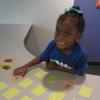
Exploring Size: Memory Game
Source Institutions
In this activity, learners play a card game that explores different size scales--macro, micro and nano.

Exploring Earth: Paper Mountains
Source Institutions
In this activity, learners explore in what ways the shape of the land and the pull of gravity influence how water moves over Earth.
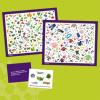
I Spy Nano!
Source Institutions
In this game, learners try to find nano-related objects on a game board. Learners investigate the different ways nano is in the world around us.
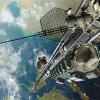
Space Elevator
Source Institutions
In this activity, learners imagine what the world might look like if we could build an elevator to space!
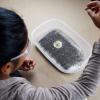
Exploring the Solar System: Craters
Source Institutions
"Exploring the Solar System: Craters" is an active, hands-on activity that demonstrates how craters form, and what they can teach us about the history and composition of planets and moons.
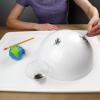
Exploring the Solar System: Magnetic Fields
Source Institutions
The "Exploring the Solar System: Magnetic Fields" activity shows participants how scientists can use tools to study the invisible magnetic fields of Earth, the Sun, and other objects in the universe.

Cutting it Down to Nano
Source Institutions
This simple activity uses paper and scissors to convey two key concepts to learners: the nanoscale is very small and working on the nanoscale requires special tools.

Exploring the Universe: Objects in Motion
Source Institutions
"Exploring the Universe: Objects in Motion" encourages participants to explore the complex but predictable ways objects in the universe interact with each other.

Exploring the Universe: Orbiting Objects
Source Institutions
“Exploring the Universe: Orbiting Objects” is a hands-on activity that invites visitors to experiment with different sized and weighted balls on a stretchy fabric gravity well.
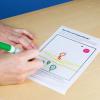
Exploring the Universe: Imagining Life
Source Institutions
“Exploring the Universe: Imagining Life” is a hands-on activity in which visitors imagine and draw an extreme environment beyond Earth, then invent a living thing that could thrive in it.

Exploring the Universe: Ice Orbs
Source Institutions
“Exploring the Solar System: Ice Orbs” is a hands-on activity in which visitors investigate a frozen orb, trying to learn about objects hidden inside.

Exploring the Solar System: Pocket Solar System
Source Institutions
“Exploring the Solar System: Pocket Solar System” is a hands-on activity in which visitors make a scale model of the distances between objects in our solar system.
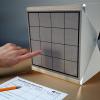
Exploring the Universe: Exoplanet Transits
Source Institutions
In "Exploring the Universe: Exoplanet Transits," participants simulate one of the methods scientists use to discover planets orbiting distant stars.

Exploring Earth: Investigating Clouds
Source Institutions
“Exploring Earth: Investigating Clouds” is a hands-on activity in which visitors create a cloud in a bottle and explore it with laser light.
